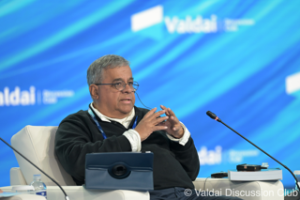Here is my presentation on Western Liberal Democracy at the Valdai conferentie on September 29, 2025.
You can download the powerpoint here.
Slide 1: welcome
I want to express my gratitude to the Foundation for Development and Support of the Valdai Discussion Club for the invitation to speak at this panel and share my views on Decolonizing The Mind and Western liberal democracy.
The theme in this session is: The Will of the People and What Is to Be Done About it? The Fate of Democracy in a World of Manipulation.
Slide 2: DTM theoretical framework
Decolonizing The Mind (DTM) is a theoretical framework that attempts to understand the world from a civilizational perspective. DTM has three dimensions:
- A critique of Eurocentric knowledge production based on the European Enlightenment.
- The development of an alternative knowledge production.
- The translation of this new knowledge into viable policies to build a new political system.
Slide 3: Liberal political theory
The European Enlightenment had produced two major schools of thought: Liberalism and Marxism. I will deal with liberal political theory and practice. Liberal political theory has six basic concepts:
- The concept of individualism. The individual is the basic unit of society.
- The concept of the separation of church and state. The state should be secular.
- The concept of the separation of powers. The government is divided into three branches: a legislature, an executive, and a judiciary (Trias Politica). This system would guarantee individual freedom from an abusive state.
- The concept of the nation-state. This assumes that one nation lives in one state. One nation means one culture. Everyone living in a state must adapt to that culture.
- The concept of universalism. The political system that has been developed in Europe should be implemented across the globe, irrespective of the specific history of a country.
- The axiomatic nature of political theory. In mathematics an axiom is a proposition that does not require empirical validation.
Slide 4: A DTM critique of Liberal political theory
I offer a critique of each of the concepts of Liberalism.
- There are multiples legitimate views possible about the basic unit of society. In Marxism class is the basic unit of society. In DTM community is the basic unit of society. For now, I will not go into the relationship between individual, class and community. I argue that it is possible and legitimate to establish a political system that reflects these different views.
- A state system should reflect the values of the people of that state. If for centuries the values of the people of a country has been based on religious beliefs, then it does not make sense to force a secular political system on them. That would be undemocratic. They should have the right to choose their own political system.
- There are other political systems possible that are more democratic that the system of liberal democracy. In Venezuela the Bolivarian Constitution acknowledges five branches of power and thus strengthens the democratic nature of the political system. Apart from the executive, legislative and judicial power there are two other branches:
- The citizens power comprised of three independent institutions: The Office of the Attorney General, The Office of the Ombudsman and The Office of the Comptroller General.
- The Electoral Power. This branch is responsible for organizing, administering, and overseeing all elections, referendums, and plebiscites.
- It does not make sense to base a political system on the concept of a nation state, while most societies in the world, including European societies are not nation-states. Multicultural societies are the norm. A democratic political system should reflect the reality of a multicultural society, but liberal political theory does not allow this.
- It is undemocratic to present a system that was developed in a small part of the world (Europe) as a system with universal application. If democracy is a concept that argues that a political system should be the expression of the will of the people, then it is undemocratic to impose a particular political system on people outside of Europe that don’t subscribe to European values.
- The liberal political system does not pass the test of empirical validation.
Slide 5: The failure in the test of empirical validation
Empirical validation of a system means that we have to test whether the liberal political system really expresses the will of the people. It fails on four accounts.
- There is colonization of the mind. In order to make up your mind as a free person, you should be able to get access to all different views without any bias. The Western media are not only biased. They create blatant lies. The victim of the crime of genocide in Gaza is portrayed as the perpetrator and vice versa. The eight o’clock news should be called eight o’ clock lies.
- Politicians are selected by the military industrial complex and then presented to the people to be elected. Once they are in power, they don’t serve the interest of the people that elected them. They serve the interest of the powers that selected them.
- A criterion to judge whether a political system is useful for its people is the criterion of performance. Everybody wants peace, prosperity, dignity and a decent and safe life. We live in an era in which liberal democracy has failed time and again to perform these major tasks.
- Liberal democracy is not genuine. It is based on hypocrisy. It preaches human rights, yet it supports the genocide in Gaza. Liberal democracy should be labeled liberal hypocrisy.
Based on these four accounts we can only conclude that the proposition that liberal democracy is an effective system of representing the will of the people is an axiom, a proposition that does not want empirical validation.
Slide 6: There are many alternatives
The world has produced many alternatives that contradict the idea that the European model has universal value. China has a political system that uplifted 800 million people out of extreme poverty in a few decades, and that is unique in world history. The system has performed very well, but it is not based on the European model.
Iran has a political system that just contradicts the basis proposition of the European Enlightenment (the separation of state and religion) and yet is more democratic than liberal democracy. It has safeguards for the rights of religious minorities. Of the 290 seats in parliament five are reserved of these groups: two for Armenian Christians, one for Assyrian and Chaldean Christians, one for the Jewish Community and one for the Zoroastrian Community.
The constitution explicitly acknowledge the specific oppression of women and instituted Islamic social infrastructures to ensure the extension of their rights, especially in education. Currently, women constituted more than sixty percent of the student enrollment and the percentage of female staff is 20-25% and is growing rapidly. These provisions are all in the Iranian constitution, but are lacking in the constitutions of liberal democracies.
Slide 7: From a unipolar world to a pluriversal civilization
We are moving from a unipolar world to a multipolar world. This process is about the shift in political, economic and military centers of power. But there is another underlying transformation taking place in the world: the transition from a universal colonial world civilization to a pluriversal decolonial world civilization. A civilization is a collection of societies based on a specific system of knowledge production. The world civilization we are living in, arose out of the colonization of the world by Europe. Its current knowledge base is the European Enlightenment. The first 150 years of the colonial civilization was based on Christian theology. It has produced economic, social, political and cultural theories that created the economic, social, political and cultural institutions of these societies. And as Europe claimed that is knowledge has universal value, so it asserts that its institution have universal value, including its system of liberal democracy.
We live in a world in which the west is in decline and the rest is on the rise. We are in the end phase of the decline of Western civilization.
Slide 8: The transition to a new world civilization
We are transitioning towards a new world civilization with a pluriversal knowledge base. India, China, Russia and Iran are not just countries, they are part of civilizations of the global south. Together with Africa, Abya Yala (the new term for the Americas) and Oceania they have produced knowledge about how to set up economic, social and cultural institutions before the rise of colonialism. The European Enlightenment is based on a civilization of death, genocide, brutal exploitation and oppression, yet it presents itself as the apex, the highest point of human civilization, that has enlightened humanity.
Before he was captured by the Spanish barbarians who invaded Tenochtitlan (now Mexico City), Cuauhtémoc, the last Aztec ruler of Tenochtitlan, held a speech in which he explained that with the Spanish invasion the sun has gone down. He said: “Our Sun is now hidden from view. The face of our Sun has disappeared, and has left us in complete darkness. But we know it will return again, that it will rise again, and it will begin to illuminate us anew.”
This contrast the idea that the Europeans have enlightened humankind.
We are in a phase in world history where we need to turn off the lights of the European Enlightenment and turn on the lights of a new decolonial world civilization.
Sandew Hira
Sochi, Russia
September 29, 2025







